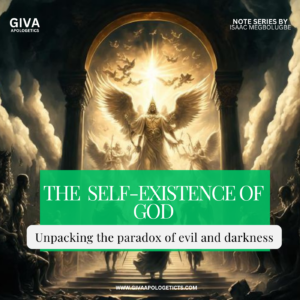The Self-Existence of God: Unpacking the Paradox of Evil and Darkness

Isaac Megbolugbe
October 10, 2024
Introduction
The age-old question has puzzled believers and skeptics alike: “If God is all-good and all-light, why does evil and darkness exist in the world?” The key to understanding this paradox lies in recognizing God’s self-existence and the nature of creation.
God’s Self-Existence
God is the uncaused Cause, the uncreated Creator. He exists independently, relying on nothing outside Himself. This self-existence is fundamental to understanding God’s relationship with creation. Psalm 90:2 (NIV) says, “Before the mountains were born or you brought forth the earth and the world, from everlasting to everlasting you are God.”
Creation and Dependence
Creation, on the other hand, exists apart from God yet depends on Him for sustenance. Colossians 1:17 (NIV) states, “He is before all things, and in him all things hold together.” This dependence underscores the distinction between God’s self-existence and creation’s derived existence.
The Absence of God, Not His Creation
Evil and darkness are not entities created by God; rather, they represent the absence of His creative order and purposes. Just as:
– Cold is the absence of heat
– Darkness is the absence of light
– Evil is the absence of God’s goodness
God did not create evil; it emerges from the rejection of His will. Isaiah 45:7 (NIV) clarifies, “I form the light and create darkness, I bring prosperity and create disaster; I, the Lord, do all these things.”
Free Will and Rejection
God granted humanity free will, allowing us to choose between embracing or rejecting His goodness. This freedom enables the possibility of evil, but it does not necessitate God’s creation of evil.
Redemption and Restoration
Despite humanity’s rejection, God can create good out of evil (Romans 8:28) and bring light to dark places (John 1:5). No created being, including the Devil, can match God’s power to transform and redeem.
Conclusion
The self-existence of God illuminates the paradox of evil and darkness. By recognizing creation’s dependence on God and the absence of His goodness as the source of evil, we can better understand the complex relationship between God’s sovereignty and human freedom.
Reflection Questions
1. How does God’s self-existence shape your understanding of creation?
2. What implications does the absence of God’s goodness have on our understanding of evil?
3. How can you recognize and respond to God’s redeeming power in your life?
Scripture Meditation
– Psalm 90:2
– Colossians 1:17
– Isaiah 45:7
– Romans 8:28
– John 1:5
May the truth of God’s self-existence and redemption bring light to the darkness, and may His goodness prevail in our lives.
Further Considerations Noted
The Nature of Evil
Evil is not a created entity but a privation of good, similar to how darkness is the absence of light. Augustine of Hippo’s concept of “privatio boni” (privation of good) explains evil as a lack or corruption of God’s intended goodness.
God’s Sovereignty and Human Freedom
God’s sovereignty and human freedom are not mutually exclusive. God’s control is not diminished by human choices, but rather, He works through those choices to achieve His purposes (Proverbs 21:1).
The Problem of Pain and Suffering
While God did not create evil, He can use pain and suffering to refine and strengthen believers (Romans 5:3-5, James 1:2-4). This perspective does not eliminate the problem of pain but provides a framework for understanding its purpose.
The Role of Satan
Satan, as a created being, cannot create or sustain life. His influence is limited to deception and temptation, seeking to lead humanity away from God’s goodness (1 Peter 5:8).
The Ultimate Triumph of Good
God’s self-existence and sovereignty ensure the ultimate triumph of good over evil. Revelation 21:4 promises, “He will wipe every tear from their eyes. There will be no more death or mourning or crying or pain, for the old order of things has passed away.”
Implications for Daily Life
Recognizing God’s self-existence and the nature of evil has practical implications:
1. Trust God’s sovereignty amidst challenges.
2. Seek God’s goodness in every situation.
3. Resist evil by choosing God’s will.
4. Share God’s redemption with others.